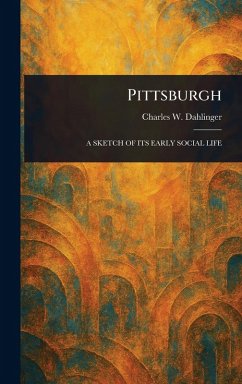Delve into the captivating past of Pittsburgh with Charles W. Dahlinger's "Pittsburgh: a sketch of its early social life." This meticulously prepared print edition offers a fascinating glimpse into the city's formative years, exploring the social tapestry and unique customs that defined early Pittsburgh society. Drawing on local history and keen observation, Dahlinger paints a vivid portrait of life in Pennsylvania's burgeoning metropolis. Discover the nuances of social interaction, the evolution of urban life, and the distinctive character of a community on the rise. This volume serves as a valuable resource for anyone interested in the social history of the Middle Atlantic region and the development of American cities. Reconnect with the roots of Pittsburgh and gain a deeper understanding of its rich cultural heritage through this enduring exploration of its early social landscape. This work has been selected by scholars as being culturally important, and is part of the knowledge base of civilization as we know it. This work is in the public domain in the United States of America, and possibly other nations. Within the United States, you may freely copy and distribute this work, as no entity (individual or corporate) has a copyright on the body of the work. Scholars believe, and we concur, that this work is important enough to be preserved, reproduced, and made generally available to the public. We appreciate your support of the preservation process, and thank you for being an important part of keeping this knowledge alive and relevant.
Bitte wählen Sie Ihr Anliegen aus.
Rechnungen
Retourenschein anfordern
Bestellstatus
Storno









